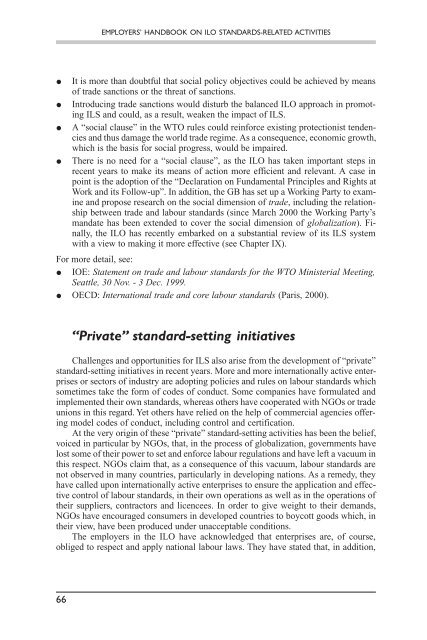Employers' Handbook on ILO Standards-related Activities
Employers' Handbook on ILO Standards-related Activities
Employers' Handbook on ILO Standards-related Activities
Create successful ePaper yourself
Turn your PDF publications into a flip-book with our unique Google optimized e-Paper software.
66<br />
EMPLOYERS’ HANDBOOK ON <strong>ILO</strong> STANDARDS-RELATED ACTIVITIES<br />
l It is more than doubtful that social policy objectives could be achieved by means<br />
of trade sancti<strong>on</strong>s or the threat of sancti<strong>on</strong>s.<br />
l Introducing trade sancti<strong>on</strong>s would disturb the balanced <strong>ILO</strong> approach in promoting<br />
ILS and could, as a result, weaken the impact of ILS.<br />
l A “social clause” in the WTO rules could reinforce existing protecti<strong>on</strong>ist tendencies<br />
and thus damage the world trade regime. As a c<strong>on</strong>sequence, ec<strong>on</strong>omic growth,<br />
which is the basis for social progress, would be impaired.<br />
l There is no need for a “social clause”, as the <strong>ILO</strong> has taken important steps in<br />
recent years to make its means of acti<strong>on</strong> more efficient and relevant. A case in<br />
point is the adopti<strong>on</strong> of the “Declarati<strong>on</strong> <strong>on</strong> Fundamental Principles and Rights at<br />
Work and its Follow-up”. In additi<strong>on</strong>, the GB has set up a Working Party to examine<br />
and propose research <strong>on</strong> the social dimensi<strong>on</strong> of trade, including the relati<strong>on</strong>ship<br />
between trade and labour standards (since March 2000 the Working Party’s<br />
mandate has been extended to cover the social dimensi<strong>on</strong> of globalizati<strong>on</strong>). Finally,<br />
the <strong>ILO</strong> has recently embarked <strong>on</strong> a substantial review of its ILS system<br />
with a view to making it more effective (see Chapter IX).<br />
For more detail, see:<br />
l IOE: Statement <strong>on</strong> trade and labour standards for the WTO Ministerial Meeting,<br />
Seattle, 30 Nov. - 3 Dec. 1999.<br />
l OECD: Internati<strong>on</strong>al trade and core labour standards (Paris, 2000).<br />
“Private” standard-setting initiatives<br />
Challenges and opportunities for ILS also arise from the development of “private”<br />
standard-setting initiatives in recent years. More and more internati<strong>on</strong>ally active enterprises<br />
or sectors of industry are adopting policies and rules <strong>on</strong> labour standards which<br />
sometimes take the form of codes of c<strong>on</strong>duct. Some companies have formulated and<br />
implemented their own standards, whereas others have cooperated with NGOs or trade<br />
uni<strong>on</strong>s in this regard. Yet others have relied <strong>on</strong> the help of commercial agencies offering<br />
model codes of c<strong>on</strong>duct, including c<strong>on</strong>trol and certificati<strong>on</strong>.<br />
At the very origin of these “private” standard-setting activities has been the belief,<br />
voiced in particular by NGOs, that, in the process of globalizati<strong>on</strong>, governments have<br />
lost some of their power to set and enforce labour regulati<strong>on</strong>s and have left a vacuum in<br />
this respect. NGOs claim that, as a c<strong>on</strong>sequence of this vacuum, labour standards are<br />
not observed in many countries, particularly in developing nati<strong>on</strong>s. As a remedy, they<br />
have called up<strong>on</strong> internati<strong>on</strong>ally active enterprises to ensure the applicati<strong>on</strong> and effective<br />
c<strong>on</strong>trol of labour standards, in their own operati<strong>on</strong>s as well as in the operati<strong>on</strong>s of<br />
their suppliers, c<strong>on</strong>tractors and licencees. In order to give weight to their demands,<br />
NGOs have encouraged c<strong>on</strong>sumers in developed countries to boycott goods which, in<br />
their view, have been produced under unacceptable c<strong>on</strong>diti<strong>on</strong>s.<br />
The employers in the <strong>ILO</strong> have acknowledged that enterprises are, of course,<br />
obliged to respect and apply nati<strong>on</strong>al labour laws. They have stated that, in additi<strong>on</strong>,

















